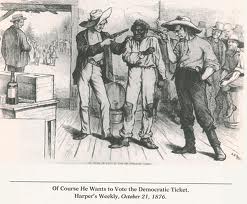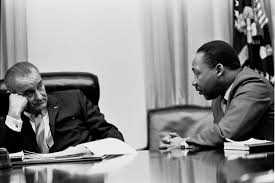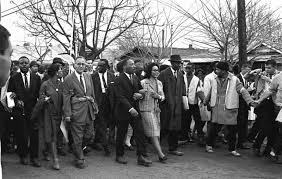
Voting Rights Past , Present In America
By Robert Lee Johnson
In the United States of America we like to use words like democracy, freedom, the free market and capitalism to describe the systems that we live under. Rarely do the media talking heads or the politicians that they interview explain the workings of our government and how it directly affects us and our communities. Today many people have become ignorant to how our government works. Some people claim to be too busy to even know who their representatives are or what they stand for; others just don’t understand or appreciate the uniqueness of the process.
At the core of our basic rights and responsibilities as citizens is our ability to elect representatives who function as our voice in the municipal, county, state and federal government. This Republican form of government is much more practical than direct democracy. Republican forms of democracy have been written about and debated from ancient Rome to the Ibo of Nigeria to the United States of America. The basic idea of a Republican form of government is that the power resides with the voting public and not with a Monarch or a Dictator. The key to making this form of government work is that there is equal protection for all citizens under the law. One person, one vote!
In 1776 the United States of America, formally 13 British colonies on the eastern seaboard of North America, declares its independence from the English Monarchy and seeks to put in place a new system of government. After defeating the British Army the new Country declares itself a Republic and extends the ability to elect government representatives only to white male property owners. As the States debated the number of representatives that each State could have based on population the slaveholding States sought to include their enslaved population in the calculation of how many representatives those States could have. As a compromise the Constitution was ratified to count slaves as 3/5 of a human being. In 1792 New Hampshire eliminated its property requirements allowing the vote to all “white men” in that State; it’s not until 1856 that North Carolina eliminates its property requirement extending the vote to all “white men” in the United States of America. In 1828 the state of Maryland removes all voting restrictions based on religion allowing Jewish men the vote.

With the American conquest of Mexico in the Mexican-American war and the annexation of California and the Southwest in 1848, Black and mixed race former Mexican citizens are barred from voting, serving on juries or testifying against a white person in court. In 1857 the Supreme Court rules in the case of Dred Scott versus Sandford that “a Black man has no rights a white man is bound to respect” this ruling deprived Black people of any redress or standing under the law it deprived us of the rights to citizenship let alone the right to vote. Legally Black people did not exist except as property.
“Government cannot endure permanently half slave, half free” Abraham Lincoln.
November 6, 1860 Abraham Lincoln was elected President of the United States of America on April 12, 1861 Confederate soldiers open fire on the Federal Fort Sumter in Charleston, South Carolina. This event marked the beginning of the Civil War which would end after four years of bloody fighting, ending with victory for the Union an end to slavery as an economic institution in the South and the assassination of a United States President by proslavery Confederate assassins. On December 6, 1865 the 13th amendment to the United States Constitution is ratified ending the institution of slavery in the United States of America. On July 9, 1868 the 14th amendment was ratified extending citizenship rights, due process and equal protection under the law. On February 3, 1870 the 15th amendment was ratified this amendment extended the right to vote regardless of “race, color or previous condition of servitude”.
 The end of the Civil War brought new opportunities for the newly freed Black population. President Abraham Lincoln saw Reconstruction as a way to bring former Confederate States back into the Union and guarantee the rights of the newly freed former slaves. The 11 former Confederate States were no longer controlled by “Confederate” State legislatures; the States were now under the rule of the United States Army.
The end of the Civil War brought new opportunities for the newly freed Black population. President Abraham Lincoln saw Reconstruction as a way to bring former Confederate States back into the Union and guarantee the rights of the newly freed former slaves. The 11 former Confederate States were no longer controlled by “Confederate” State legislatures; the States were now under the rule of the United States Army.
On April 9, President Lyndon B. Johnson the Civil Rights Act of 1966 was passed
The Civil Rights Act of 1866 extended rights of citizenship to all persons born in the United States of America. In March of 1867 the Reconstruction act of 1867 was passed, dividing the former Confederate States into military districts.
According to the Reconstruction Act the former Confederate States would not be readmitted into the Union until they enacted State constitutions granting former slaves the right to vote and ratification of the 14th amendment to the United States Constitution.
By the 1870s Black citizens were voting and taking office in the newly reconstructed South. In February of 1870 Hiram Revels of Mississippi becomes the first Black elected United States Senator. In March of 1875 the Civil Rights Act is passed by Congress it makes illegal, discrimination in public transportation, hotels, theaters and jury selection. New Republican legislatures in the former Confederate States were a combination of Black “Freeman” Northern whites called “Carpetbaggers” and white southerners who were Pro-Reconstruction known as” Scalawags”.
These legislatures developed public schools, raised taxes to rebuild the broken infrastructure and established charitable institutions to help those devastated by the war. In March of 1875 Black Mississippi Republican Blanche Bruce is elected to the United States Senate he is one of many Black Republicans who have taken office in the newly reconstructed South from State Assemblyman, to Congressman, to Governor, and United States Senator it seems that the newly freed former slaves with the power of the vote would soon be able to have control over their own destinies.
The former Confederate legislators and their power elite fought back against Reconstruction politically and with violence carried out against the Black Freemen, Carpetbaggers and the so-called Scalawags. Assassinations, lynching, beatings and intimidation were not uncommon. Most of the violence was carried out by the Ku Klux Klan and other allied groups. As an answer to the growing violence against the Reconstruction governments in the South, Congress passes the Enforcement Acts in 1870 and 1871 making it a federal offense to deny a citizen their civil rights it also allowed the President of the United States to use the military to enforce the law. Pres. Grant used these laws and the United States Army to crush the Ku Klux Klan in the early 1870s. In May of 1872 the Congress passed and Pres. Grant signed the “Amnesty Act” this was legislation that restored voting rights and the ability to hold public office to the former Confederate legislators and military leaders who had rebelled against the United States of America. In 1873 the
“Panic of 1873” led to an economic depression that paved the way to the end of Reconstruction. By 1875 the “Redeemers” a coalition of white supremacist, former Confederate, Conservative Pro-business Southern Democrats who were led by rich Southern landowners controlled eight of the 11 former Confederate States. By 1877 in what has been described as a corrupt deal President Rutherford B. Hayes becomes President of the United States and withdrawals Federal troops from the South leaving Black Americans at the mercy of Southern white Supremacist.
Unfortunately for the Black citizens of the “Redeemed” South the white Supremacists that were now in control had no mercy. A case in point would be the “Colfax massacre” in Colfax, Louisiana April 13, 1873 where in a confrontation with white Republican officeholders, a group of armed white Conservative Southern Democrats executed over 100 Black Freemen who had surrendered to them. The federal government prosecuted and convicted some of the perpetrators of the Colfax massacre their convictions were appealed to the United States Supreme Court which ruled in “United States versus Cruikshank (1876) that the 14th amendment did not apply to individuals but only to actions of state governments, this ruling made the Enforcement Act of 1870 useless in prosecuting groups like the Ku Klux Klan and the White League. Lynching intimidation and voter suppression soon dislodged all of the gains made by Black Freemen during Reconstruction. Those gains were replaced with the Black codes of the 1890s which led to the Jim Crow laws and the disenfranchisement and segregation (separate and horribly unequal) of the Black community for almost 100 years. The North may have won the war but the Southern white Supremacist had won the peace.
The Black codes of the 1890s along with vagrancy laws, poll taxes, literacy tests, the grandfather clause and the threat of racial violence were all design to disenfranchise the Black population and keep them at the economic and social mercy of Southern white Supremacists.
In 1915 the United States Supreme Court rules that Oklahoma’s grandfather clause (if your grandfather could not vote neither could you) is unconstitutional. In 1920 the 19th amendment is ratified into law allowing women the right to vote. In 1948 state laws denying Native Americans the right to vote are overturned. Boycotts, civil disobedience and protest led by organizations such as the NAACP, the Congress of Racial Equality, the Southern Christian leadership Conference and the Student Nonviolent Coordinating Committee began to put pressure on American society and the government to fulfill its promise of equal protection under the law. To enforce the law against the white supremacist who with government approval had been suppressing the rights of Black Americans. The 1957 Civil Rights Act among other things allows the United States Atty. Gen. to file lawsuits on behalf of Black people who have been denied the right to vote. The Civil Rights Act of 1960 allows for the collection of state voter records to become mandatory for possible use in civil rights litigation.
In 1964 the 24th Amendment to the United States Constitution outlawed the poll tax as an unconstitutional violation of the equal protection clause of the 14th amendment. Continued agitation in the streets and in the courthouse eventually leads to the 1964 Civil Rights Act which puts an end to legalized segregation in the United States. After years of watching unarmed, peaceful Black demonstrators men, women and children being beaten, bitten by dogs battered by high-powered fire hoses and attacked with cattle prods all in an effort to simply do their civic duty and vote like every other American citizen. The bloody bodies and the supreme sacrifice of the civil rights martyrs affected the conscious of the nation and led to the passing of the 1965 Voting Rights Act which provided millions of disenfranchised Black people the ability to vote without fear of lynching, beatings, or intimidation for the first time since Reconstruction.
beaten, bitten by dogs battered by high-powered fire hoses and attacked with cattle prods all in an effort to simply do their civic duty and vote like every other American citizen. The bloody bodies and the supreme sacrifice of the civil rights martyrs affected the conscious of the nation and led to the passing of the 1965 Voting Rights Act which provided millions of disenfranchised Black people the ability to vote without fear of lynching, beatings, or intimidation for the first time since Reconstruction.
MLK with wife Coretta march with the people for the right to vote.
In 1971 the 26th Amendment lowers the voting age to 18. In 1993 the National Voter Registration Act requires States to permit registration at the Department of Motor Vehicles and the Unemployment office as well as mail-in registration. In November of 2008 the United States of America elected its first Black President Sen. Barack Hussein Obama.
On June 25, 2013 the Supreme Court’s conservative majority ruled by a 5 to 4 decision to strike down section 4 of the 1965 Voting Rights Act as unconstitutional affectively crippling the Voting Rights Act. Within hours of the Supreme Court decision several former Confederate States and other States with conservative Republican State legislatures initiated voter suppression legislation in an effort to disenfranchise Black voters in those States. For those of you who are paying attention you may see an obvious pattern. Remember a “right” is only a “privilege” if they can take it away from you. We have hundreds to thousands if not millions of young men and women who are disenfranchised because they are convicted felons. This is not true in every State but it is definitely true in Southern States where those votes can make a huge difference in who is running the state. You have to ask yourself, if voting is a civic duty why are conservative Republican right wing politicians trying to make voting as difficult as possible? Why are they purposely trying to suppress Black voters? Does history give us a clue?
Conservative Southern Democrats during Reconstruction are today’s Conservative right wing Republicans. For those who believe that not voting is rebellion, it’s not! It’s surrender!
“The Struggle Continues”